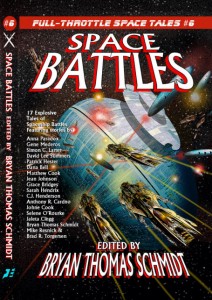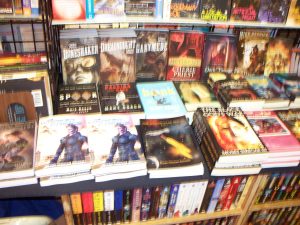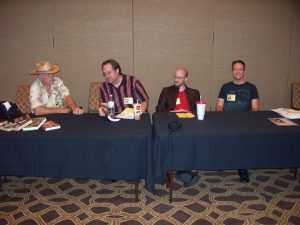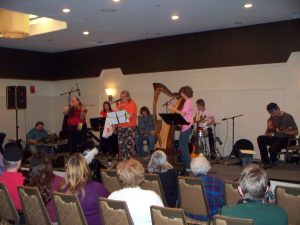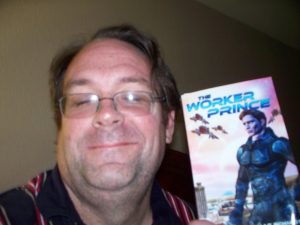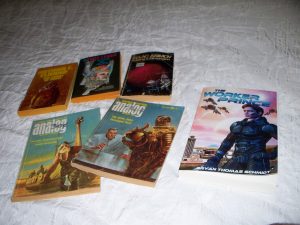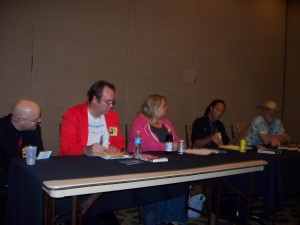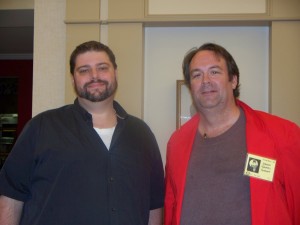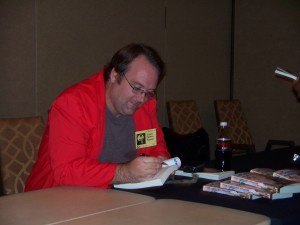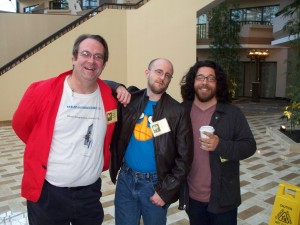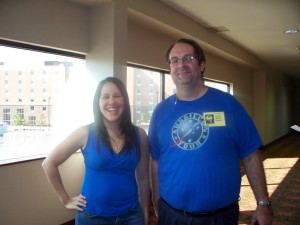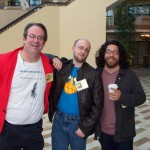 Love it or hate it, for the modern author Conventions and Appearances come with the job. These can be a great deal of fun or a great deal of stress or both. I’ve done 9 Cons since 2010, 5 since March 2012. (You can check out my appearances here.) I’ve enjoyed them all for different reasons and yet some were better than others. Still, overall, the contact with fellow creatives and the public is a stimulant to creativity even if it drains time away from writing while I’m there. The biggest strain, of course, is budget. Cons are not cheap. But still, if you take the time to learn how to maximize them, there can be great benefits. Here are Ten Lessons I’ve learned from Cons and Appearances so far:
Love it or hate it, for the modern author Conventions and Appearances come with the job. These can be a great deal of fun or a great deal of stress or both. I’ve done 9 Cons since 2010, 5 since March 2012. (You can check out my appearances here.) I’ve enjoyed them all for different reasons and yet some were better than others. Still, overall, the contact with fellow creatives and the public is a stimulant to creativity even if it drains time away from writing while I’m there. The biggest strain, of course, is budget. Cons are not cheap. But still, if you take the time to learn how to maximize them, there can be great benefits. Here are Ten Lessons I’ve learned from Cons and Appearances so far:
1) Selling Books Is Hard. A good signing/appearance tends to be around 12-13 books for me so far. As a new, relatively unknown author, it’s really hard to get people to try out your stuff. You do readings at which 4 attendees is a good turnout. You do bookstore appearances/signings and are happy if three people an hour actually stop to talk. At Cons, you do tons of panels and hand out info cards and are happy if people take them with any enthusiasm. In dealer’s rooms, if 5% of those who stop to look buy your book, you’ve done well. If you are a writer thinking selling the book is the easy part, think again. It’s hard. I don’t know how this compares with those whose publishers have thousands to spend promoting their books, but for micropress writers like me with promotion coming from my own time and money, selling books is hard.
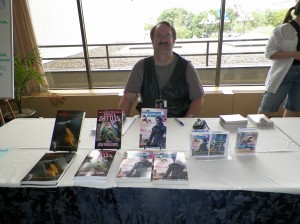 2) Face-To-Face Matters. I realize many authors are socially awkward. We spend so much time alone by ourselves writing that social skills are not being developed. And many of us started out socially awkward in the first place. Thus, public appearances can be nerve-wracking and stressful. Still, nothing gets people’s interest like a face-to-face encounter. If you’re nice, funny, interesting, etc., people take notice. They realize you might be someone whose voice they’d like to spend time with listening. And this leads to sales and word of mouth. It’s a slow process, in my experience, but I’ve definitely seen it enough to know it’s true.
2) Face-To-Face Matters. I realize many authors are socially awkward. We spend so much time alone by ourselves writing that social skills are not being developed. And many of us started out socially awkward in the first place. Thus, public appearances can be nerve-wracking and stressful. Still, nothing gets people’s interest like a face-to-face encounter. If you’re nice, funny, interesting, etc., people take notice. They realize you might be someone whose voice they’d like to spend time with listening. And this leads to sales and word of mouth. It’s a slow process, in my experience, but I’ve definitely seen it enough to know it’s true.
3) Most of Your Sales Come After Cons Online Or In Stores. No matter how few or many books sell at a Con or appearance, I always know more a week or two later by looking at online sales and Author Central. Almost always we see numbers increase from people who met me or saw me at a distance and went to buy my books. I don’t know if this is because they don’t trust buying from you, worry about pressure sales if they approach or what. PayPal is secure, people. Whatever the reasons, I do see most sales coming from online or stores, even when I offer discounts through my website store, which I still can’t figure out.
4) Partnering With Dealers Has Advantages And Disadvantages. If you’re going to a Con, it’s always good to check out the dealers and see if you can find someone to either order copies of your book to sell or accept them from you on consignment. You will be expected to offer 25-40% of the price to the vendor, but I have still been able to sell books at a slight discount off retail when doing this. The bigger issues come from expectations. One, you should expect the vendor to display your books in a way that customers will see them, but not necessarily center stage and upstaging the vendor’s own wares. Two, pairing with a bookseller for books is better than pairing with another type of vendor. Vendors selling gadgets and toys will get customers who are easily distracted from books by their other wares. Clothing vendors have customers who aren’t looking for books. And so on. Booksellers are the best bet, but regardless of the vendor’s product, all of them expect you to get people to the table and come by to help sell your book. Working with booksellers makes this easier because they know how books sell, even those by unknown authors. Their expectations will therefore be appropriate. A toy vendor I worked with complained that I didn’t jump up and run out to pitch every customer who touched my book. My experience is that having a table between you is less intimidating than standing next to them on the sales side of the table and that being pushy is less effective than being casual and nice. Offer to answer questions, tell them a little about it, and even offer to sign it, yes, but being pushy is something to do at your own risk. Vendors don’t always understand because you are taking table space from their wares and sometimes the stuff they sell is sold well with a bit of push.
5) Plan Time To Be In The Dealer Room. If you have product for sale, it’s a really good idea to plan time to be at the dealer table greeting customers, signing, etc. Not just because of what I said in item 4 but because not everyone will see you at panels, readings, etc., and sometimes knowing the author is there makes buying a book more enticing. So check out the dealer room hours, compare it to your schedule for panels, etc., and plan some time. Remember: dealer rooms keep daytime hours. They will close at night, even when panels are still ongoing, so if you can, use the gaps during dealer room hours to be present and save your alone time, etc. at night for the much needed breaks. One good way to do this is to plan to bring carryout food to eat in the Dealer’s Room and eat behind the table so you can jump up and greet, etc. when customers stop by. Also, be sure and help sell the vendor’s other items, too. It shows a commitment to team and partnership that vendors will really appreciate.
6) Learn To Set Limits. Cons and appearances are tiring. You can only do so much. Overcommit at your own peril.I’d say 2-3 panels a day is a pretty good chunk, especially if you have readings and signings on top of that. It doesn’t seem like a big deal, but when you wind up doing two morning panels and then two late a night, you will realize your day has gotten really long quick. Also, being on panels requires a lot of focus. You have to be cheerful and nice and smiling, and you also have to try and give intelligent output, which also requires energy. Plus, banter with fellow panelists is also important. I did 4 programming items a day at the last Con and after the first day felt like I’d done the whole Con already. I was so tired. And I still had another day and a half to go. Some have more energy than others. But this applies especially if you are staying at a cheaper off-site hotel and you don’t have a room to run back to for a nap or recharge. Big Cons, especially, have no quiet corners for that much needed Introvert recharge either. So you can find yourself stuck in crowded, noisy areas for whole days with no real breaks and it wears you out. Also, if you actually plan to attend panels, parties, etc., the more tired and overcommitted you are, the less able you will be to not only participate in those activities but enjoy them.
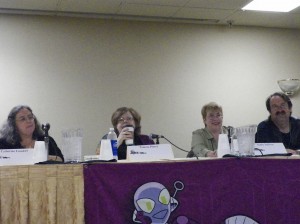 7) Preparation Saves Stress. Think up questions which you might ask on a panel or might be asked and practice answers. They won’t come out exactly the same way at the time, but at least you’ll have some coordinated, coherent thoughts already floating in your head to pull out and use. If you do get asked to moderate, you’ll have some idea how to approach it. With readings, you need to practice reading slow, at a good pace. If you can read with some character voice changes, it makes it far more interesting than reading with the Ben Stein-drone. At least know which passages you plan to read and how long it takes to read them. And have an idea what you’ll say to introduce the scenes and your book as well as yourself for panels and readings. Keep it short but don’t be afraid to highlight your credentials. And if you’re new, holding up a copy of a book or two is perfectly fine. It creates a visual memory for panel attendees who might later see it in the dealer room and consider buying it.
7) Preparation Saves Stress. Think up questions which you might ask on a panel or might be asked and practice answers. They won’t come out exactly the same way at the time, but at least you’ll have some coordinated, coherent thoughts already floating in your head to pull out and use. If you do get asked to moderate, you’ll have some idea how to approach it. With readings, you need to practice reading slow, at a good pace. If you can read with some character voice changes, it makes it far more interesting than reading with the Ben Stein-drone. At least know which passages you plan to read and how long it takes to read them. And have an idea what you’ll say to introduce the scenes and your book as well as yourself for panels and readings. Keep it short but don’t be afraid to highlight your credentials. And if you’re new, holding up a copy of a book or two is perfectly fine. It creates a visual memory for panel attendees who might later see it in the dealer room and consider buying it.
8 ) Spread Them Out. Doing a Con every weekend may sound fun in theory if you like Cons, but in practical fact, besides being expensive, it’s quite tiring and stressful. Sometimes it will be unavoidable. But most of the time, you can alternate Cons with local signings, readings, etc. in such a way to give yourself time to rest and recover in between. I also think you benefit from geographically spreading out appearances. I blocked out a number of driving distance cons this year and prioritized based on location, cost, guest list, expected attendance, etc. to determine which I should aim for and which I could skip or leave for “if I have time.” If you have books to promote, you can’t really show up last minute and expect to do signings, readings or panels. But if you’re well known or just going to network and participate as a fan, you can definitely just make last minute choices. I like to vary Cons in size a bit but generally Cons of large attendance numbers are easier to get lost and forgotten in than smaller Cons. You also have better chances to do panels at smaller cons, although there are exceptions.
9) Take Pictures.If you have publicists you work with, they will constantly nag you about this. My publicist friend does. If you don’t have that, you should remember and find people to take pictures for you. In every panel, if you get there before hand, you can find a fan who’d be willing to take a few pics. Remember, you get what you get. If you’re anal about pictures and how they’re framed, etc., it’s better to bring your personal photographer along. Otherwise, ask them to shoot several and hope you get something you can use. But pictures are helpful for blogs, PR, websites, and more, so having them is really helpful and if you’re by yourself, you want to be in them, so you’ll need help.
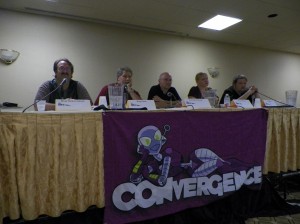
10) Take Handouts. Have business cards, info postcards, book sell sheets, etc. and make use of the free literature tables scattered throughout Cons. Some have one, most have several. Put your stuff out and stop by from time to time to see if anyone’s taking them or to replenish the stack. Be sure and pick up extras before you leave, although I always leave a few behind for last minute people to take in case. Business cards will be helpful for fellow authors, editors, artists, etc. Postcards with book cover info, your website, a few blurbs, a small bio, etc. are good to hand to fans at panels, signings, etc. I use sell sheets at my book tables for people to take even if they don’t buy the book on the spot. Many people come back Sunday to make their purchases, browsing first to decide where they want their limited funds to go. So don’t miss the chance to give them something which might bump your book up on the list.
I’m sure I’ll do plenty more Cons and appearances this year and beyond, as my career is only just beginning (I hope). So there’ll be more lessons learned by this time next year, but for now, I hope these are helpful. Love to hear your thoughts and lessons learned in comments, too. For what it’s worth…
 Bryan Thomas Schmidt is the author of the space opera novels The Worker Prince, a Barnes & Noble Book Clubs Year’s Best SF Releases of 2011 Honorable Mention, and The Returning, the collection The North Star Serial, Part 1, and several short stories featured in anthologies and magazines. He edited the anthology Space Battles: Full Throttle Space Tales #6 for Flying Pen Press, headlined by Mike Resnick. As a freelance editor, he’s edited a novels and nonfiction. He’s also the host of Science Fiction and Fantasy Writer’s Chat every Wednesday at 9 pm EST on Twitter under the hashtag #sffwrtcht. A frequent contributor to Adventures In SF Publishing, Grasping For The Wind and SFSignal, he can be found online as @BryanThomasS on Twitter or via his website. Bryan is an affiliate member of the SFWA.
Bryan Thomas Schmidt is the author of the space opera novels The Worker Prince, a Barnes & Noble Book Clubs Year’s Best SF Releases of 2011 Honorable Mention, and The Returning, the collection The North Star Serial, Part 1, and several short stories featured in anthologies and magazines. He edited the anthology Space Battles: Full Throttle Space Tales #6 for Flying Pen Press, headlined by Mike Resnick. As a freelance editor, he’s edited a novels and nonfiction. He’s also the host of Science Fiction and Fantasy Writer’s Chat every Wednesday at 9 pm EST on Twitter under the hashtag #sffwrtcht. A frequent contributor to Adventures In SF Publishing, Grasping For The Wind and SFSignal, he can be found online as @BryanThomasS on Twitter or via his website. Bryan is an affiliate member of the SFWA.


